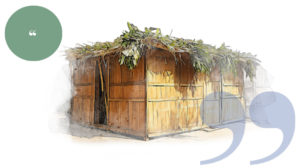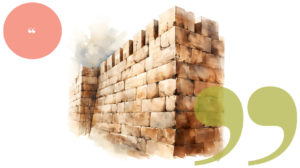Letting Our Butterflies Hatch
| January 13, 2010Bright-eyed and personable, she is not stupid, misbehaved, or learning-disabled. She’s simply “not ready.”

“Morah, Morah, the butterflies hatched!”
Beaming children greet me at the door of their pre-1A classroom, where I recently began teaching a weekly specialty class. I share their excitement and tell them, “Guess what! You’re like butterflies, too. I watch you learning and growing every day, just as the butterflies did inside their cocoons. Now, come my little butterflies. Why don’t we put on our butterfly wings and fly off down the hallway?”
On tiptoe, we joyously flutter along to the classroom.
But “Elisheva” lingers, out of step with the others. She has not grasped the intent behind this endeavor. I know that once I begin class, I will need to continuously draw her into the activity at hand, while she will continuously, playfully, distract herself.
Bright-eyed and personable, she is not stupid, misbehaved, or learning-disabled. She’s simply “not ready.” As a former first-grade teacher, I sigh as I think about the struggle she will most likely endure in the year — if not years — ahead.
I recall a passage I read many years ago, whose message remains powerfully with me.
I remember one morning when I discovered a cocoon in the bark of a tree, just as a butterfly was making a hole in its case and preparing to come out. I waited a while, but it was too long appearing and I was impatient. I bent over and breathed on it to warm it. I warmed it as quickly as I could and the miracle began to happen before my eyes, faster than life. The case opened, the butterfly started slowly crawling out and I shall never forget my horror when I saw how its wings were folded back and crumpled; the wretched butterfly tried with its whole trembling body to unfold them. Bending over it, I tried to help it with my breath. In vain.
It needed to be hatched out patiently, and the unfolding of the wings should be a gradual process in the sun. Now it was too late. My breath had forced the butterfly to appear, all crumpled, before its time. It struggled desperately and, a few seconds later, died in the palm of my hand.
That little body is, I do believe, the greatest weight I have on my conscience. For I realize today that it is a mortal sin to violate the great laws of nature. We should not hurry, we should not be impatient, but we should confidently obey the eternal rhythm. (From Zorba the Greek, by Nikos Kazantzakis)
I am not familiar with the particulars of Elisheva’s situation, but based on my experience as a first-grade teacher, I imagine her parents were advised to give her the extra year of nurturing and play that she needs. And I imagine that the same loving, dedicated parents pushing her on ahead, thinking, “We’ll work with her. She’s a bright child. It will all be okay.”
And I wonder … why?
Do we remove challos from the oven before they’re fully baked? Do we buy the watermelon that doesn’t yield the ripe thwunk, or pick roses before they’ve bloomed? Why, I wonder, are we willing to stunt the growth of our most precious treasures, our children?
I have heard the answers, ranging from the pragmatic to the preposterous: “It’s another year of tuition.” “She’ll be getting married a year older than her friends.” “Her sister also had a slow start and is fine.” “What will people think?” “If it doesn’t work out, we’ll have her repeat first grade.”
Just as warming a butterfly prematurely released from its cocoon cannot give it the development it missed, positive attention and stickers will not enable an unready child to sit at a first-grade desk, to raise her hand, hold a pencil, work independently, organize her belongings, do homework, or absorb first-grade concepts. Boosting her with extra tutoring and support when she is exhausted from the effort she has already put forth in school is counterintuitive, and can even be damaging. And if that doesn’t work … we’ll do it for another year? Ouch.
As a teacher I have often delighted in the well-adjusted top students in my class only to discover at times that they were a full year older than some of their peers. Children innately enjoy the challenge of learning, the growth of discovery. When we force them to grasp for something that is beyond their ability, we stifle this beautiful natural process.
(This leads me to a related and painful pet peeve of mine, the current trend of increasingly challenging even our brightest children’s delicate psyches with greater and greater expectations, in classes where they must put in inordinate amounts of effort just to keep up. Again, why?)
Looking at the butterflies in my students’ classroom, it is impossible to tell the difference between the ones that emerged first, and the ones that took an extra week to spread their wings. But, had we coaxed the delayed butterflies out of the safe havens where they were miraculously developing, hidden from the eye, the differences would have been eternally evident.
Dear parents, please, ease your child up the ladder to success one rung at a time. Don’t force her to stretch her legs and stumble as she leaps the wide gaps of missing rungs. Often the ability to repeat Pre-1A (or better yet kindergarten) is the greatest gift you can give a child.
I don’t suggest this is the solution to every child’s learning challenge, and of course each situation is unique, but if you sense that this may be what your child needs; don’t rob her of her future success, because of imaginary stigmas or optimistic denial.
Give her the gift of joyous self-discovery; the gift of easy, timely development; the gift of confidence and socialization; the gift of scissors and stories. Give her the gift of patience … not pressure. Give her the gift of play for another day, so that at the right time she will fly off through the gift of tomorrow.
(Originally featured in Family First, Issue 204)
Oops! We could not locate your form.







